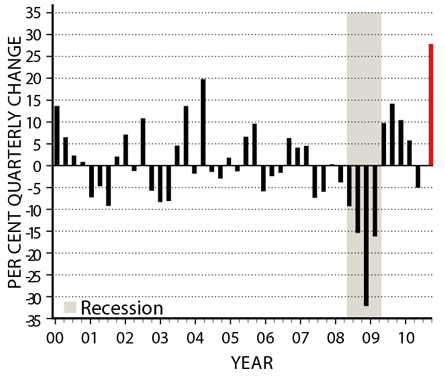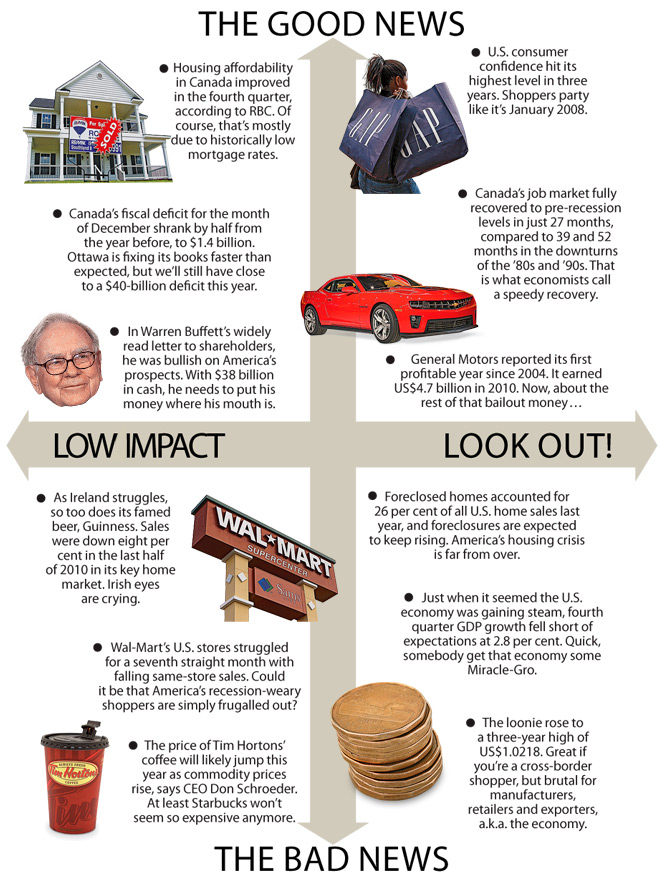Econowatch: March 2011
A monthly scorecard on the state of the economy in North America and beyond
Share
Once again contagion looms over the global recovery. Not long ago, investors feared the prospect of which nation the sovereign debt crisis would infect next—having taken Greece and Ireland, would Portugal fall? Spain? Britain? Now unrest is spreading across the Middle East and North Africa as brutalized populations revolt against their tyrannical leaders. And the focus is squarely on whether soaring energy prices could push the global economy back into recession.
Some have argued the subprime crisis didn’t cause the Great Recession, but that it was the fault of the 2008 spike in oil prices. If so, watch out. The price of Brent crude jumped to above US$119 amid the crisis in Libya, before easing back to around US$111. In a new report, Nigel Gault, chief U.S. economist at IHS Global Insight, analyzed the effect on the American economy of a US$10 rise in the price of oil. No surprise—a gallon of gas jumps 24 cents. But each US$10 increase also raises inflation .38 per cent and lowers disposable incomes .26 per cent. If the price rise persists, economic growth gets zapped by more than half a percentage point over a two-year period, as does spending. Meanwhile, 410,000 jobs would be lost. Given that oil has rebounded from about US$40 a barrel since early 2009, it explains a lot about why the recovery has been so disappointing.
What happens now depends on how far the turmoil spreads, and whether panicked traders continue to push oil prices higher. For David Kotok, chief investment officer at Cumberland Advisors and a strategist closely watched for his views on energy issues, the outlook is grim. “This is nowhere near over,” he writes. “The risk of recession in the U.S. and European economies is rising daily.”

Movers and shakers:
-On a trade mission last week, Saskatchewan Premier Brad Wall shook hands with the Queen and sought to reassure foreign investors after battling BHP Billiton’s proposed US$40-billion takeover of Potash Corp. last year. Wall also met with BHP executive Andrew Mackenzie and reported there were no “hard feelings.”
-Struggling with falling sales and stiff competition, Loblaws is putting its turnaround hopes in the hands of retail veteran Vicente Trius, who will take over from Allan Leighton as president later this year. He’ll inherit at least one good asset: Loblaws’ Joe Fresh clothing line is booming, with plans to open new stores in the U.S.
-Twitter co-founder Biz Stone has been denying rumours that his site is for sale. But partners are welcome. JP Morgan is reportedly set to buy a 10 per cent stake in the firm for $450 million. If Stone ever does sell, that puts the asking price at $4.5 billion.
Sign of the times:
BP still faces a costly legal nightmare following last year’s catastrophic spill in the Gulf of Mexico, which is so far estimated to cost US$41 billion. But that doesn’t necessarily mean the oil giant is scrounging for cash. A recent US$7.2-billion deal to buy offshore oil fields in India means that BP has now spent more on acquisitions since January 2010 than it has taken in from asset sales—including those that took place under a special program created to help fund Gulf cleanup efforts. According to analysts at Citigroup, BP spent nearly US$24 billion over the past 14 months on everything from new deepwater properties in the Gulf of Mexico to a stake in an Arctic exploration project, while selling only about US$21-billion worth of assets, including holdings in Alberta’s oil sands. With the price of oil soaring once again, BP and its shareholders clearly have their sights set on laying the groundwork for future profits as opposed to paying for past mistakes.
By the numbers:
$1,250
The hourly rate some corporate lawyers in New York are reportedly charging. Through the recession, rates typically topped out at $990 an hour.
30,000
The number of people who took to the streets in Greece last week to protest austerity measures put in place in the wake of the country’s $146-billion bailout.
$32,499
The minimum income Canadians say a family of four needs to get by, according to an Angus Reid poll. That’s about the same as the low income cut-off line for an urban family.
$11.3 million
Toronto-Dominion Bank CEO Ed Clark’s compensation last year. The bank had record earnings of $5.2 billion in 2010.
$100 billion
Target Corp.’s projected annual income within seven years, as it grows in the U.S. and expands into Canada. Hudson’s Bay, beware.
Chart of the week:
Export explosion

Canadian exports jumped over 27 per cent in the fourth quarter of 2010. It was the biggest quarterly gain since 1982 and the main reason GDP rose 3.3 per cent in the same period.
